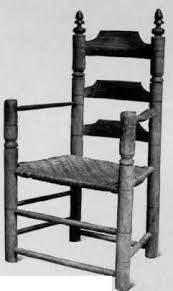From this WSJ review of Abigail Carroll’s Three Squares, a book about American eating habits across the centuries, here are two eyebrow-raising excerpts.

1. In 1744, a traveler was invited to eat a meal with a ferryman and his family. The traveler describes it this way in his journal: “They had no cloth upon the table, and their mess was in a dirty, deep, wooden dish which they evacuated with their hands, cramming down skins, scales, and all. They used neither knife, fork, spoon, plate, or napkin because, I suppose, they had none to use.”
2. “‘Only about a third of the families in seventeenth-century Virginia had chairs or benches, and only one in seven had both,’ writes Ms. Carroll. Only about a quarter of the early Virginian houses had tables.”
Once again we sigh nostalgically for the good old days. Or maybe not. Widespread hygiene and mass-produced furniture are achievements of the modern world, especially the ongoing scientific-medical-biology revolution and the industrial revolution, both of which took off in the mid-1700s.
Related: This series on the liberal capitalism that made its practitioners rich and free:
I’ve always been fascinated about how people lived in centuries past. There are a lot of documentaries on YouTube that I watch regularly. I give a silent thank you for being born in the late 20th century. We take so much for granted. Even during the early 20th century, deodorant was not widely used.
I can never understand the environmentalist who want us to return to life as pre-historic humans lived. They wouldn’t last two seconds in the 17th century. I’m honest to say I wouldn’t either. Yet they’ve managed to convince whole nations, including our own that we should reduce energy exploration, regulate out of existence coal and nuclear power; and accept $3.50 gallon of gas. This goes to show how bad ideas can literally ruin human lives.
Busted an eardrum a couple of years ago while wakeboarding on a nearby lake. By the next morning had a slight infection and was at a walk-in clinic to get an antibiotic to clear it up.
While sitting in the waiting room the thought crossed my mind that had this very minor event happened even 85 years ago the infection would probably have gotten worse, even to the point of permanent hearing loss in that ear and possibly even led to death. A close study of history should cure all but the most naive minds of nostalgia for by-gone eras. But like a friend of mine who participates in medieval reenactments complete with armor and the works observed about most of the folks at those events, everyone imagines they would have been the knight and not the peasant.
Excellent fiction book that covers this. The Awakening Land: The Trees, The Fields, & The Town.
Thanks for the rec.